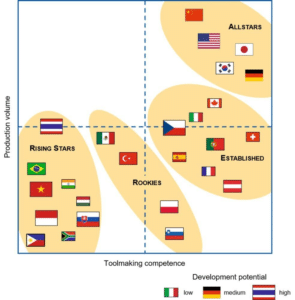
Tooling Market Overview
Tooling Market Overview
The World of Tooling research carried out by WBA Aachener Werkzeugbau Akademie GmbH and Werkzeugmaschinenlabor, WZL der RWTH Aachen provides a thorough analysis of the recent critical developments in the global tooling sector. Although tool demand had been rising consistently until 2018, the Covid epidemic has produced economic downturns and disturbed supply chains, which has slowed growth in several areas. Champion exporters of tools like China, South Korea, and Japan have managed to keep part of the flows of global value-added.

Manufacturing companies and toolmakers are increasingly turning to international toolmaking markets in this environment of persistent uncertainty to stably supply production locations with tools, realize cost savings, and overcome operational bottlenecks.
The research compares the 26 most essential tooling markets based on their market size, toolmaking proficiency, and development potential. It provides thorough information on each of these areas. This data is based on various quantitative and qualitative evaluation approaches, such as expert interviews, benchmarking information, economically essential numbers, and personal travel experiences. The benchmarking data is based on the biggest toolmaking database in the world, which contains more than 3,000 assessed overseas tool shops and more than 1,000 benchmarking data sets of German tool shops that are less than five years old.
The survey also includes rising economies like Thailand and Brazil in addition to well-established toolmaking markets like China, Germany, and the USA. While not directly related to toolmaking, these markets are growing in importance due to their potential as locations for manufacturing and their capacity to offer affordable tools.
Rising stars
Rising Stars are economies that are receiving more investment in their economies despite having lower production volumes and toolmaking proficiency. India, Vietnam, Indonesia, and Malaysia are the markets named Rising Stars. As each of their sectors expands, there is a rising demand for items used in toolmaking in these nations. Future growth is anticipated to be particularly strong in India, thanks to its sizable population, welcoming business environment and expanding government backing for the manufacturing sector. Due to its cheap costs, Vietnam is already a well-liked location for manufacturing, and the government is taking steps to enhance the educational system and encourage research and development.
Rookies
Rookie markets have a higher output volume but a lesser level of toolmaking proficiency. In the future, these markets might increase their proficiency in toolmaking. The report names Mexico, Turkey, Brazil, Thailand, and Poland as Rookies. For toolmaking businesses looking to move some of their manufacturing, Mexico and Turkey in particular provide advantages due to their closeness to the US and Europe, respectively. Although Brazil has a well-established automotive sector, it still lags in terms of toolmaking proficiency. Poland, on the other hand, is appealing to toolmaking businesses because of its central location in Europe, low wage level, and strong educational system.
Established
Established markets in the tooling industry are characterized by having high to very high toolmaking competence, but a lower production volume than the Allstars. These markets include countries such as Italy, Canada, Austria, Spain, France, the Czech Republic, Portugal, and Switzerland. Most of these markets are suitable for contracting complete tools, and some have proximity to major automotive centers while also having access to Eastern European markets. Despite the challenges, these markets remain important players in the global tooling industry.
Allstars
The Allstars group identified in the World of Tooling study includes some of the world’s leading toolmaking markets, including Germany, Japan, South Korea, the USA, and China. These countries are characterized by both high levels of toolmaking competence and large production volumes, making them essential for supplying international production sites with tools and reacting to capacity bottlenecks. Despite economic declines caused by the Covid pandemic, the study shows that global value-added flows have not come to a complete standstill in these countries, making them key players in the global tooling industry.
Overall, the World of Tooling research offers insightful information on the toolmaking markets, including each sector’s advantages and disadvantages. It emphasizes the significance of toolmaking proficiency in the context of global business and offers suggestions for organizations seeking to grow their businesses or acquire tools on global marketplaces. Many experts worked on this and the whole research can be found in the German language under the downloads section on the WBA Aachener Werkzeugbau Akademie GmbH website.